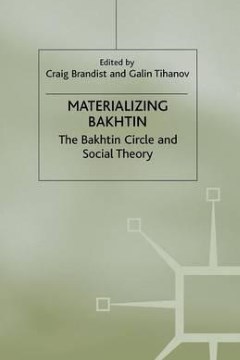Repository | Book | Chapter

(2000) Materializing Bakhtin, Dordrecht, Springer.
"A very understandable horror of dialectics"
Bakhtin and Marxist phenomenology
Michael Gardiner
pp. 119-141
Two of the more unexpected events of 1998 included the New Yorker magazine naming Karl Marx as the most significant thinker of the dawning millennium, and the prominent display of a new, 150th anniversary edition of The Communist Manifesto in upscale Wall Street bookstores, rendered in eye-catching design by the leftist publisher Verso. Yet despite such flashes of interest in Marx — call it "radical nostalgia," as opposed to "radical chic" — one would be hard-pressed to describe the last two decades as favourably disposed towards Marxism. In particular, postmodernist theories have been exceedingly hostile towards the philosophical inheritance of Hegel and Marx, especially the dialectical method. Recourse to dialectics is generally associated with grand, totalising social theory and a "foundationalist" epistemology, of an approach that assumes arrogantly that the essential structure of society, and the overarching sequence of historical development, can be described and analysed with what Marx himself called the "precision of the natural sciences". For the postmodernists, the dialectical method claims a privileged insight into the underlying mechanisms of social change, and is likened to crystal-ball gazing, a form of sociological mysticism that, along with other misbegotten Enlightenment metanarratives, should be dumped unceremoniously into the trash-bin of history.
Publication details
Full citation:
Gardiner, M. (2000)., "A very understandable horror of dialectics": Bakhtin and Marxist phenomenology, in C. Brandist & G. Tihanov (eds.), Materializing Bakhtin, Dordrecht, Springer, pp. 119-141.
This document is unfortunately not available for download at the moment.



